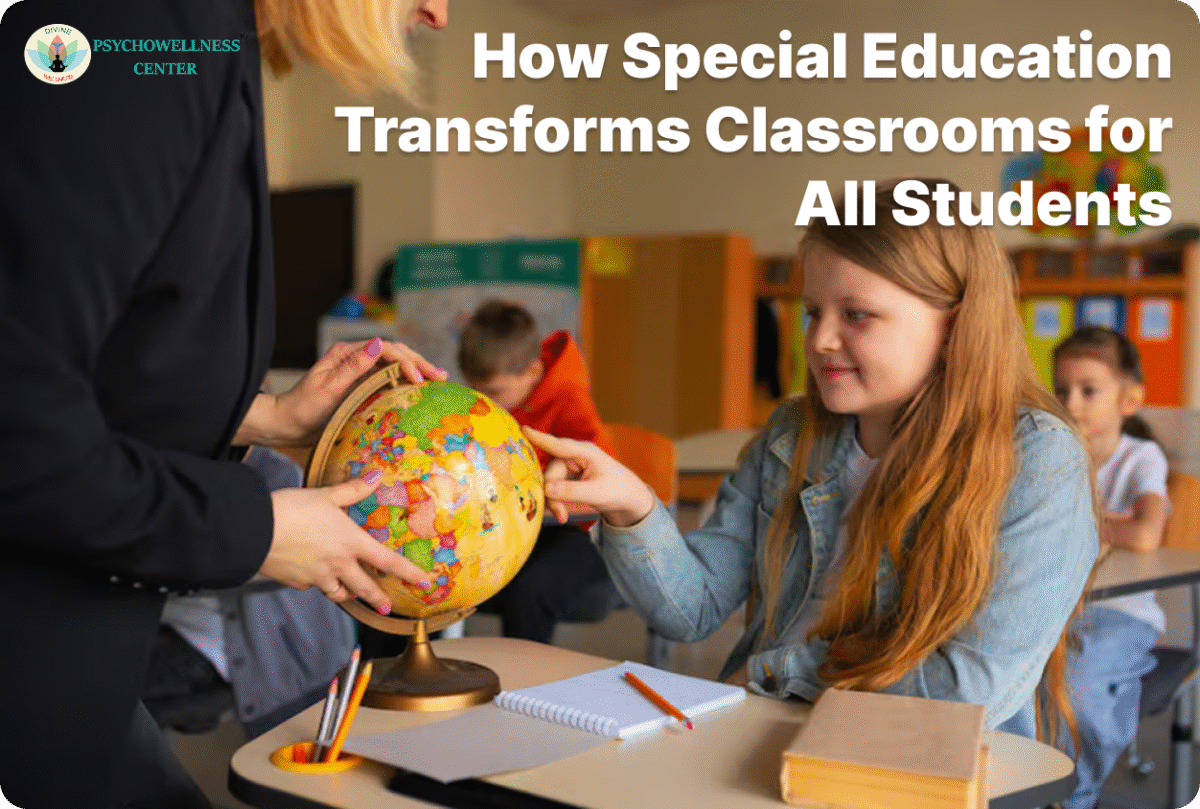In today’s diverse and evolving learning environments, special education is no longer a service designed solely for a select group of students; it represents a transformative, inclusive approach that benefits every learner. While its primary goal is to support students with disabilities, learning differences, or developmental delays, the strategies and values embedded in special education such as individualised instruction, differentiated learning, and empathy-driven teaching enhance the overall educational experience for all. By promoting collaboration, emotional awareness, and adaptive teaching methods, special education helps create classrooms where diversity is celebrated, not merely accommodated. Teachers become more responsive, peers develop compassion and respect for differences, and schools cultivate a culture of equity and belonging. Ultimately, special education doesn’t just improve outcomes for students with special needs, it elevates the entire learning community, ensuring that every child has the opportunity to thrive academically, socially, and emotionally.
Understanding the Modern Classroom
Students today come to school facing a wide range of emotional, behavioral, and cognitive challenges. Issues such as anger, anxiety, depression, stress, and family problems are becoming increasingly common among school-aged children. These emotional struggles often lead to low self-esteem, low self-confidence, isolation, and even loneliness, which can hinder academic and social development.
Moreover, students with developmental delays often struggle to keep pace with traditional teaching methods, which can further alienate them from their peers and the learning environment. Without adequate support, these students may experience failure early on, which creates a cycle of frustration and discouragement.
The Role of Special Education in Addressing Emotional and Behavioural Needs
Special education doesn’t only target academic difficulties; it also addresses the emotional and behavioural challenges that many students face. Through individualised education plans (IEPs), school psychologists and trained special educators, schools can provide targeted interventions that help students cope with:
- Anger management
- Anxiety reduction techniques
- Depression screening and support
- Stress management skills
These strategies don’t just benefit students with diagnosed disabilities; they often trickle into general education classrooms through inclusive practices, where everyone learns how to handle emotions in healthier ways.
Inclusion: A Win-Win for All Students
Inclusion is a fundamental aspect of special education, which involves integrating students with disabilities into general education classrooms when feasible. This practice has shown tremendous benefits for all students.
For students with disabilities:
- It reduces isolation and improves self-esteem
- Encourages peer interaction
- Promotes a sense of belonging
For neurotypical or typically developing students:
- It fosters empathy and understanding
- Teaches collaboration and communication
- Normalises diversity in learning styles and abilities
In fact, when inclusion is properly implemented, it helps dismantle the stigma often associated with special education. Students start viewing differences as assets instead of shortcomings.
Building Social and Emotional Skills for Life
Incorporating special education techniques into mainstream classrooms encourages the development of emotional intelligence and resilience among all students. This is especially critical in addressing:
- Low self-confidence that arises from social comparison
- Loneliness among students who feel like they don’t belong
- Behavioural issues stemming from family problems or trauma
Group activities, peer mentoring, and social-emotional learning (SEL) programs often championed by special educators create safer emotional spaces where students can grow without fear of judgment.
Support Systems that Reach Beyond the Classroom
Another crucial element of special education is its emphasis on collaboration with families. Students don’t live in a vacuum, and issues like family problems, financial stress, or lack of parental support can deeply affect learning. Special educators often bridge this gap by:
- Engaging families in intervention planning
- Connecting families with community resources
- Offering counselling and parenting workshops
This holistic approach ensures that students receive consistent support at both school and home, enhancing their chances for long-term success.
Conclusion
Special education is not just a system for students with learning challenges it’s a compassionate, research-backed approach that uplifts entire classrooms. By addressing the root causes of anger, anxiety, depression, stress, and isolation, and by promoting inclusion, it creates a learning environment where every student feels seen, supported, and empowered. As we continue to advocate for educational reform and mental health awareness, integrating the principles of special education into all areas of schooling is no longer optional, it’s essential.
For educators, parents, or students seeking guided support in building inclusive, emotionally healthy learning spaces, the Psychowellness Center, located in Dwarka Sector-17 and Janakpuri, New Delhi (011-47039812 / 7827208707), offers professional counselling, strength-based coaching, and therapy tailored to help individuals recognise and leverage their personal strengths. Their team of top psychologists uses evidence-based approaches such as CBT, REBT, and Mindfulness-Based Therapy to nurture emotional resilience, empathy, and positive behaviour key elements for thriving inclusive classrooms. For flexible online access, TalktoAngel provides online counselling and strength-oriented therapy to help students, teachers, and parents apply these insights in real-life educational settings. By combining personal reflection with expert guidance, schools and families can transform challenges into opportunities for growth, fostering a culture of understanding, hope, and shared success for all learners.
Contribution: Dr. R.K. Suri, Clinical Psychologist, and Ms. Drishti Rajore, Counselling Psychologist
References
Here are some suggested references to support the content in your blog. You can expand or modify these as needed:
- American Psychological Association. (2020). Stress in America: Youth survey. Retrieved from https://www.apa.org
- Individuals with Disabilities Education Act (IDEA), 20 U.S.C. § 1400 (2004).
- National Association of Special Education Teachers (NASET). (2023). Inclusion and its benefits. Retrieved from https://www.naset.org
- Centers for Disease Control and Prevention. (2023). Children’s mental health. https://www.cdc.gov/childrensmentalhealth
- Collaborative for Academic, Social, and Emotional Learning (CASEL). (2022). Social and emotional learning (SEL). https://casel.org
- https://www.psychowellnesscenter.com/Blog/role-of-inclusive-education-for-students-with-communication-disorders/
- https://www.psychowellnesscenter.com/Blog/building-a-healthy-school-environment-for-children-with-special-needs-cwsn/
- https://www.psychowellnesscenter.com/Blog/need-for-special-education-for-children-with-specific-learning-disabilities/
- https://www.psychowellnesscenter.com/Blog/behavior-management-techniques-in-special-education-settings/
- https://www.psychowellnesscenter.com/Blog/breaking-the-stigma-changing-perceptions-about-special-education/
- https://www.psychowellnesscenter.com/Blog/types-of-assistive-technology-in-special-education/
- https://www.psychowellnesscenter.com/Blog/best-special-educator-in-delhi-cantt/

